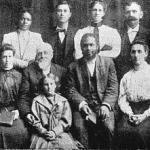A good movie is hard to find. Bad writing, bad acting and even worse morals are the norm for much of what Hollywood is shoveling out these days. And more often than not, self-styled Important Films that Say Something wind up being thinly-disguised propaganda for the political left. Apparently, that rare breed of film that simply tells a story isn’t considered Important enough in and of itself.
While he has quietly voiced some conservative opinions, actor Robert Downey, Jr. seems like an unlikely candidate to lead a revival of substantial, thought-provoking movie-making. But the star who’s made millions in mainstream superhero flicks has surprised his fans by expressing a desire to do just that, with a production company he and his wife have co-founded themselves. The Judge is their debut project. And while the Hollywood establishment is wrinkling their noses at it, it appears that the majority of ordinary movie-watching Americans are giving it a thumbs up.
The film is billed as a courtroom drama, whose two main characters are a father (Robert Duvall) and son (Downey, Jr.) attempting to find reconciliation after decades of silence and bitterness. The father is the county judge, and the son, Hank, is an arrogant hotshot lawyer. (His tagline: “Innocent people can’t afford me.”) When their wife and mother dies, Hank’s return re-opens old family wounds. And just when it seems things couldn’t get worse, his father is involved in an accident that looks suspiciously like murder. What’s more, the Judge is suffering from memory loss and can’t recall any of it. There’s only one decent choice for Hank: Stay and defend his old man in court. But that may be easier said than done.
The father-son bonding premise intrigued me, and after watching this trailer, I was hooked by the acting and the writing (note: one crude slang term). I decided to see the film and give it my own verdict. My verdict is that The Judge is simultaneously the best and most frustrating movie I’ve seen all year.
I can give two reasons right off the bat why it’s the best, and they both start with a D: Downey and Duvall. In a word: Dynamite. These two actors are so intense on the screen together, I believed every word of every scene they played. I believed the pain, the anger, the regret, and beneath it all, the love between this stubborn mule of a father and this selfish jerk of a son. The critics say it’s sentimental hogwash. They must have watched the wrong movie. This movie is an honest, wrenching depiction of what re-building a relationship looks like.
As in real life, the humbling process is not a smooth curve. Moments of real love and tenderness alternate with moments of explosive rage. In one of the most moving scenes, the Judge is struggling to walk and unable to control his bodily functions. Hank gently helps his father into the tub and begins to shower him down. And right at that moment, his little daughter knocks on the bathroom door. “What are you doing in there?” The men look at each other and begin to laugh softly. “What do you say?”
It’s a beautiful moment, and yet several scenes later, they’re at it hammer and tongs all over again. Hank’s younger brother Dale sums it all up in a scene shortly after the Judge’s fateful accident. Hank is driving and asking his father a rapid-fire series of questions, and as the exchange peaks, he slams the brake and flies backwards into the driveway, stopping just short of the garage. As his brothers watch from a distance, Dale observes, “We shouldn’t let them drive together.”

Both of the brothers are well done. Dale is autistic and carries a vintage camera everywhere with him, obsessively filming family moments. Oldest brother Glen is the good son, the well-adjusted family man who put down his roots in the family’s small Indiana town. One of the deepest wounds between Hank and his father is that Glen lost a promising baseball career when he injured his hand in a highschool car accident. And Hank was behind the wheel, high on drugs. While Glen himself is content with his lot, the Judge has never forgiven Hank. In a wonderful scene between the brothers during the trial, Glen is close to a breakdown and lets out some of his own built-up hurt. Hank offers him an assuring pat on the back, and Glen shrugs it off, sensing condescension. “Don’t pat me. Don’t pat me. I’m the older brother here, you don’t pat me.”
Besides being a compelling story of fathers and sons, The Judge is an excellent legal drama that delves into profound questions about justice, mercy, truth, and conscience. Watching Judge Palmer as the case unfolds, we feel the weight of the man, the power and the dignity, even as his body begins to fail his mind. We can almost palpably sense this formidable presence that fills the courtroom—fiercely proud, abidingly committed to the law, and valuing his own integrity above anything. Crucially, his pride keeps him from allowing Hank to use his illness as a mitigating circumstance in court. In an especially refreshing bit of dialogue, he expresses admiration for Ronald Reagan, lamenting that “Any mention of his legacy ends with jellybeans, naps and Alzheimer’s.” I won’t drop any spoilers about the final verdict, but I’ll just say that I thought I could stay a step ahead of the plot. Then it caught me off guard with a major twist. Then it knocked me for a loop with an equally unexpected finale that stuns even the odious prosecutor into something like compassion, something like awe. (The prosecutor is played by Billy Bob Thornton, in fine scenery-chewing form.) There’s this one line in particular that’s so good, and the symbolism… ahhhh, but I won’t give it away.
Reflecting on the film’s themes, Downey, Jr. has said, “I love a movie that speaks of unrequited things and coming to terms. In life you must show up for uncomfortable things. Often, what you find in the end is some clarity and some dignity.”
Well said. Unfortunately, this movie is not unalloyed gold. In the middle of everything else, Hank is getting a divorce. It’s not quite clear who’s leaving whom, but consensus seems to be that Hank is dissolving it. The character of his wife is barely developed. We learn that she’s been depressed (understandably, given the kind of man Hank is) and had a one-time fling with someone else. They’re battling over custody of the little girl, who’s a very sharp tac. She surprises Hank by asking when the divorce will be finalized, and he fumbles lamely that this kind of thing “takes a long time… happens in stages.” “Your stuff is in boxes,” she observes. “That’s a stage.”
Meanwhile, Hank’s old highschool flame is conveniently still single and waiting for him back in the old place. We’re supposed to assume she has a heart of gold, never mind the fact that she’s repeatedly urging a married man to cozy up and settle down with her. This begets a gratuitous rabbit trail of a subplot involving her (and, blindly, her grown out-of-wedlock daughter, in a particularly unsavory sequence). Needless to say, this distracts mightily from the movie and its attempt to strike a lofty, moral tone. She even ruins the denouement with one final “offer” that he plans to accept, the larger implication being that he will indeed settle down with her and become a complete man. Thankfully, the actual closing sequence ends on an uplifting note that brings the movie back to its main focus, but the promise of more infidelity dulls the uplift.
Admittedly, the whole thing does fit the movie’s man-centric, testosterone-laden oeuvre, but it undercuts its own message to men by implying that all that stuff about taking responsibility for your actions comes with a built-in exception for cheating on your wife. Three cheers for Real Manhood(TM)! Critics and movie-goers alike have commented that this subplot would serve the film much better on the cutting room floor. Self-edit it out for yourself, and I guarantee you’ll miss nothing significant. Of course, the movie thinks the girlfriend is significant to Hank’s transformation, which is the problem.
Hank’s failed marriage is also the only weak point in the interactions with his father. The first time the Judge brings it up, he taunts Hank with it during a heated argument. Then much later in the film, he apologizes, and Hank asks him seriously what he would do. But his father can offer nothing except an “I don’t know” and “Do you think you can make each other happy again?” Really? This should be one of the most vital conversations a man has with his son, and that’s what we get. Interestingly, this is also the only conversation where God gets a mention. Hanks asks out of the blue if his father believes in God, and we get one line: “I’m 72 years old with stage 4 cancer. What choice do I have?” Hey, great conversation starter… except it’s a conversation ender.
Needless to say, The Judge is not a Christian film (there’s a lot of very harsh language flying around to boot), nor is it even a particularly political film. But something about it seems to be rubbing critics the wrong way. Some of the criticism is justified. Besides the bad sub-plot and over-long running time (I counted at least four potential ending scenes), there are a few other heavy-handed moments in the script. For example, a pivotal family conflict takes place during a literal tornado, which seems like symbolic overkill. There are also a couple of plot holes that have been fairly pointed out. Still, most of the criticism boils down to the tone. Progressives want to write it off as sentimental, small-town, father-son bonding mush—presumably because it takes small towns, fathers and sons seriously. The core of The Judge is deeply American and deeply masculine. Both are considered faux pas in today’s entertainment milieu. The un-ironic positive reference to Reagan is part of that tone as well, and I’m sure it also garnered some eyerolls among the elite.
For my own part, as I mulled the film over the other day, something clicked that made sense of it all—the good parts, the bad parts, the solid moral foundation undergirding one scene and the shifting sand our characters flounder through in the next. This is what I realized: The Judge represents exactly how far the American ethic can take you. On the one hand, it takes you to some true and beautiful places. It affirms things we know intuitively are natural, right and good about manhood, justice, and honor.
But like all good things, masculinity becomes an idol when it’s revered uncritically, and this film doesn’t seem too concerned about the less honorable side of that coin. Its tone towards Hank’s dalliances is an “Oops, that happened!” at best, and at worst it’s actively nudging him away from his marriage. The father-son relationship is rich and full of wisdom, until the really hard questions about God and fidelity arise—then it abruptly falters and trails off. Why? The movie’s moral code is not ultimately based on God’s word. It’s a noble pagan’s code, which means it gets some important things right and fails spectacularly on other important things. Ultimately, it can’t save a man’s marriage, nor can it save his soul.
And that’s why I consider The Judge to be the most disappointing film of the year. In its best, most profound moments, it reduced me to a puddle of tears and tissues. It’s still something I would recommend for fathers and grown sons to see. But it could have been so much more. It could have been great, when instead it is merely good. It wants to celebrate good things, but it doesn’t have all the pieces of the puzzle that would allow it to celebrate them in their proper context. As The Judge says:
“Let’s have a toast. To whatever, I don’t know, but let’s have a toast.”

















